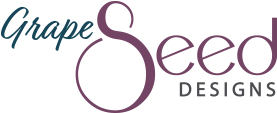You’re starting a new business. And you’re smart — you know a brand is important to set you apart from the competition. A good brand proves you’re professional and credible.
But you’re also savvy — you understand the value of bootstrapping to grow the business with little to no debt.
So how do you get started, and what’s most important to prioritize?
The truth is, you need to really clarify your mission, purpose, and offering before spending much on your brand. The first couple of years require agility to pivot as needed to serve your customers best — you need to do business to explain your business.
But you still need a way for customers to identify you. This is where the first iteration of your brand comes in, and it makes sense to start off DIY.
Plus, with modern technology and resources, a DIY brand is more attainable than ever. You don’t need a fine arts degree to set a stable foundation.
Note: a couple of things that are very important to get right from the beginning include the name of your business and any legal structures. These can be difficult and costly to change down the line, so focus any cash resources on laying a solid foundation here.
Take a look at 3 reasons a DIY brand is a good choice for your first time out of the gate.
Make An Affordable Choice
It’s expensive to start a new business! And you want to focus any investments, especially financial ones, where they’ll have the biggest impact.
So I don’t recommend dumping all your cash into a multi-thousand dollar brand right away. You don’t even have to break the bank for a fancy logo (we’ll explore how to establish a simple DIY logo soon, as well as what a logo should reasonably cost — stay tuned).
Side note: if you’re looking to launch and scale a business quickly, and especially if you already have solid funding, this advice may not be for you. However, if you’re minimizing cash spend, pre-seed, or working on a pitch deck, please continue on.
What you DO need, though, is to pay close attention to the foundations of your brand and how they make your customers feel. This comes through with colors, typography, and imagery.
Get to Know Your Brand Inside and Out
There’s no better way to know something intimately than by doing it yourself — you already know that about your craft! But many business owners are so deep in their work, they often can’t explain it well to the rest of the world.
This is why a DIY brand can be so helpful — by forcing yourself to look at it directly, to explain it to others and see their reactions, you understand exactly what’s working and what’s not.
Plus, your business is likely to make a few pivots in the first few years. Almost nobody’s plan goes exactly as expected, and your brand should be simple and flexible enough to adjust with you. The KISS system is important as you settle in to your flow.
Then, as your business grows and you are ready to make a deeper investment, you know exactly what you need and can communicate with a designer even better.
Iterate While You Pivot
Now remember, while you definitely want a solid foundation, your brand will go through iterations. And that’s ok! You’ve been through a few transformations as an individual, I’m sure — but you’re still the same you.
The same goes with your brand. You can make tweaks and refinements from one iteration to the next without losing sight of who you (and your business) really are.
Plus, a good designer can take your existing brand down the line, balance what is and isn’t working, and provide an update that’s both refreshing and consistent with your established brand. Extra bonus: a quick polish and refresh is often more affordable than ground-up branding. At the very least, the process will be more powerful and effective by knowing where you’ve been and where you want to go.
So don’t be afraid to start right where you are and leave room to keep growing in the future.
Ready to DIY your brand, but want some extra support?
For a more affordable approach to professional-looking design, I provide one-on-one coaching and consulting calls.
These calls provide professional insights, resources, and a little extra accountability. Leverage these tools to create your first brand, build your online presence, and develop an effective marketing strategy.

